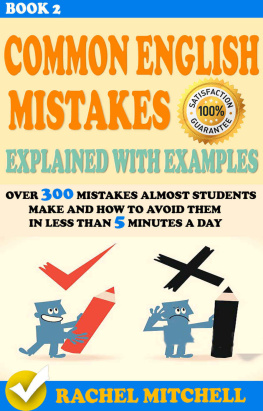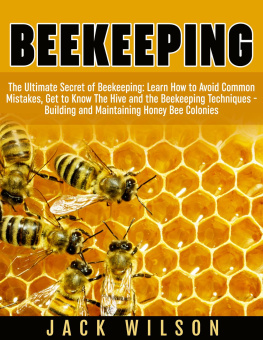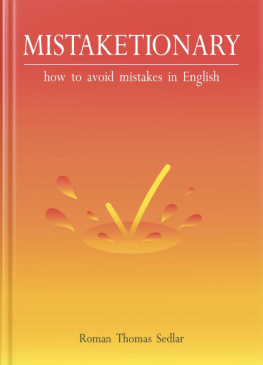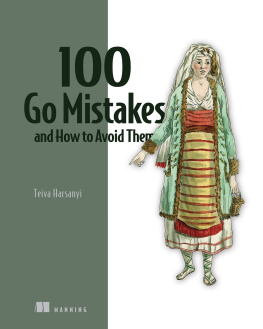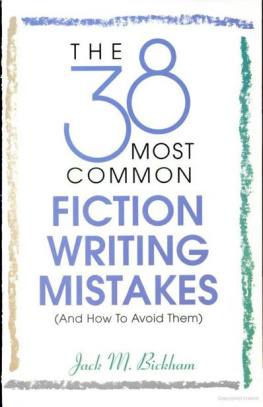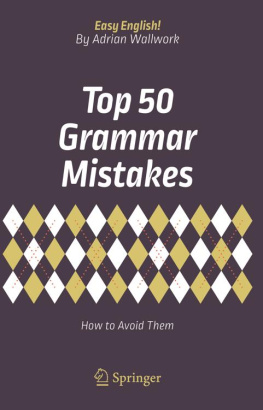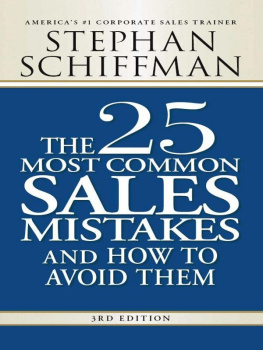English mistakes are thethings most learners make in study and practice. Learning the most typicalmistakes may help students build considerable confidence, become error-free,and successful in using English.
The book is well designed andwritten by an experienced teacher who has been teaching English for more than 20years to make sure that all the mistakes inside are the most typical and usefulfor students at each level.
As the author of this book, Ibelieve that this book will be an indispensable reference and trusted guide foryou who may want to learn from the most common mistakes in English vocabularyand grammar, so they could use English in a correct but natural way. Once youread this book, I guarantee you that you will have learned an extraordinarilywide range of useful, and practical English mistakes that will help you becomea successful English learner, particularly in examinations such as CambridgeFCE, CAE, CPE, and IELTS; as well as you will even become a successful Englishuser in work and in life within a short period of time only.
Over Top 300Mistakes Almost Students Make and How to Avoid Them
We say much/far younger than , (NOT very younger than).
He's much/far younger than Iam. (Dont say: He's very younger than I am.)
Her husband is much/far olderthan she is. (Dont say: Her husband is very older than she is).
Chinese is much/far moredifficult than French. (Dont say: Chinese is very more difficultthan French).
We say a journey , (NOT a travel). Travel isuncountable.
We had a long journey throughthe mountains. (Dont say: We had a long trave l through the mountains).
We had a long journey by coachfrom the north to the south of the country. (Dont say: We had a long travel by coach from the north to the south of the country).
I wish you a good journey!(Dont say: I wish you a good travel !).
We say a loaf of bread , (NOT a bread ). Bread is uncountable.
She bought a loaf of bread.(Dont say: She bought a bread ).
She taught me how to make aloaf of bread. (Dont say: She taught me how to make a bread ).
We say a piece of equipment , (NOT an equipment ). Equipment is uncountable.
I bought a piece of equipmentfor my kitchen. (Dont say: I bought an equipment for my kitchen).
The surface area of a desk isoccupied by a piece of equipment. (Dont say: The surface area of a desk isoccupied by an equipment ).
Describe a piece of equipmentin your home. (Dont say: Describe an equipment in your home).
We say a piece of furniture , (NOT a furniture ). Furniture is uncountable.
This sofa is a piece offurniture. (Dont say: This sofa is a furniture ).
I bought a piece of furnitureat the store. (Dont say: I bought a furniture at the store).
A chair is a piece offurniture for one person to sit on. (Dont say: A chair is a furniture for one person to sit on).
We say a piece of information , (NOT an information ). Furniture is uncountable.
He brought me a piece of information.(Dont say: He brought me an information ).
A rumor is a piece ofinformation that has not been verified. (Dont say: A rumor is aninformation that has not been verified).
His telephone number is apiece of information. (Dont say: His telephone number is an information ).
We say a piece of advice , (NOT an advice ). Furniture is uncountable.
He gave me a piece of advice.(Dont say: He gave me an advice ).
Let me give you a piece ofadvice. (Dont say: Let me give you an advice ).
We say a fact , (NOT a knowledge ). Knowledge is uncountable.
Baldness is a fact of lifefor men. (Dont say: Baldness is a knowledge of life for men).
I know for a fact that he waslying. (Dont say: I know for a knowledge that he was lying).
It is a fact that theInternet makes peoples lives become more convenient. (Dont say: It is aknowledge that the Internet makes peoples lives become more convenient).
We say a piece of luck , (NOT a luck ). Luck is uncountable.
What a piece of luck! (Dontsay: What a luck !).
A piece of luck happened to him.(Dont say: A luck happened to him).
We say piece of luggage , (NOT a luggage ). Luggage is uncountable.
A piece of luggage carried ontop of a coach. (Dont say: A luggage carried on top of a coach).
Wherever Peter goes, heleaves a piece of luggage behind. (Dont say: Wherever Peter goes, he leaves a luggage behind).
At the airport she realizedthat she had left a piece of luggage at home. (Dont say: At the airport sherealized that she had left a luggage at home).
We say a piece of news , (NOT a news ). News is uncountable.
I have a piece of news totell you. (Dont say: I have a news to tell you).
I just read a piece of newsabout lung cancer on the website bbc.co.uk. (Dont say: I just read anews about lung cancer on the website bbc.co.uk).
We say an experiment , (NOT a research ). Research is uncountable.
We carried out an experiment.(Dont say: We carried out a research ).
A scientist performed anexperiment on mice. (Dont say: A scientist performed a research onmice).
We say a piece of rubbish , (NOT a rubbish ). Rubbish is uncountable.
He picked up a piece ofrubbish and put it in the trash can. (Dont say: He picked up a rubbish and put it in the trash can).
We pick up a piece of rubbishfloating by the roadside. (Dont say: We pick up a rubbish floatingby the roadside).
Everyone can pick up a pieceof rubbish every day. (Dont say: Everyone can pick up a rubbish everyday).
We say a job , (NOT a work ). Work is uncountable.
She has applied for a job ata department store. (Dont say: She has applied for a work at adepartment store).
Tom graduated last year buthe still can't find a job. (Dont say: Tom graduated last year but he stillcan't find a work ).
We say her hair is , (NOT her hair are ). Hair is uncountable.

